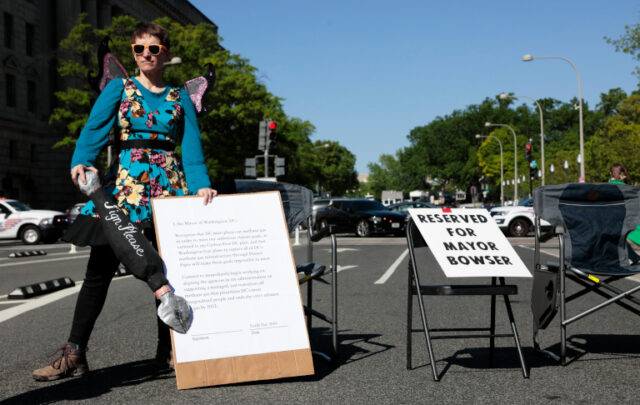Things are getting back to what passes for normal in Capital City. The agencies shuttered by the longest government shutdown in US history are once again open. Whether they remain that way when the continuing resolution (CR) keeping them open passes its February 15th sell-by date is quite another matter. The odds of a second shutdown-showdown are admittedly slim. There are simply too many Republicans in Congress not wanting to face their constituencies—yet again—having to explain Trump’s manic attachment to a wall—whether of concrete or steel. However, we are talking about Donald John Trump and a feckless bunch of Republican Senators, so anything is possible.
The fallout from the month-long melee between Trump, Speaker Pelosi, and ultra-right political opinionators like Anne Coulter will take a toll on the environment in ways less obvious than cutting down protected trees in Joshua Tree National Park. Trump, as he twits endlessly, doesn’t like losing; a thing he seems to be doing a lot more of these days.
After two years in office, the president is still learning that politics—whether in the District of Columbia or Albian, Iowa—isn’t played like real estate or the casino business. The odds of rising from the ashes of a political bankruptcy in Washington are infinitesimal compared to Atlantic City. It is hardly surprising in a town whose motto is “if you want a friend in Washington, buy a dog.”
The fallout I’m speaking of here is Trump venting his pent-up frustration on the environment through the singular power of the presidency. One of the few things Trump can do with relatively little interference by Congress or the courts is to issue executive orders and directives demanding federal agencies like the US Departments of Energy, Interior, and Transportation and the Environmental Protection Agency prop up coal companies and clear the way for oil and gas pipelines.
I don’t pretend to know what’s in Trump’s head, nor do I long for an inside glimpse of it. The Donald, like many of us, is a creature of habit. His habit as president is to prove to himself, his core supporters and once loyal opinionators that he is the man he thinks he is and promised to be by undoing things—often in a capricious and petulant manner. It was the way he got into the shutdown-showdown in the first place. He’s done it other times as well. Let me count just some of the ways. Trump has:
- Announced the US would be pulling out of Syria in two-weeks’ time.
- Started a trade war with China.
- Promised trade wars with Germany and other EU countries, Canada, Mexico, and South Korea
- Pulled the US out of the Paris Climate Agreement when he did.
- Ordered the rollback of all Obama era climate policies and programs.
- Levied tariffs on steel and other products and commodities that have proven harmful to US farms and industries like solar.
I can’t say with certainty that White House staff are this minute thinking up ways to go after clean energy sources and the environment. I do think the odds are good and that industry and climate groups should be on the lookout for this happening. There are rumblings afoot.
Rumor drives Washington, much like Fox News drives Trump. It’s not always just idle gossip; rumor serves many functions, not the least of which is to test the waters of a thorny idea or proposed action. Make believe is not the sole purview of elected politicians and their staff. Industry and other special interest groups will start rumors as a preemptive strike on something they don’t want to happen. As well, whispered messages can be used to plant the seeds of ideas they do want to happen.
Clean energy and the environment are high-value targets in Trumpworld. There is an efficiency to going after them. Support for fossil fuels can be offered either directly by asking the Secretary of Energy to convince the Federal Energy Regulatory Commission (FERC) to keep uneconomic coal-fired power plants open, or indirectly by slapping a tariff on photovoltaic panels and steel tubing—making solar less competitive. Actions that limit renewables in some way can also be touted by Trump to the climate-science deniers in his audience, as proof of he’s still in command no matter what conservative opinionators have to say.
Future executive actions currently rumored to be the topic of White House discussion involve infrastructure and the Clean Water Act. One of the first executive orders issued by Trump looked to expedite environmental reviews and approvals for high-priority infrastructure projects. The order, signed on January 24, 2017, partially fulfilled his campaign promise to make American energy dominant in the world. The Order was subsequently used by the State Department to guide the environmental impact statement it issued in support of its approval of the Keystone XL pipeline.
Recent events suggest that Trumplicans are considering the need for a second pipeline-centric presidential directive. A federal court in Montana halted Keystone XL inviting the Administration to come back after it conducts a valid environmental impact statement. The one submitted violated both the National Environmental Protection and the Endangered Species Acts.
Another possible reason for a new pipeline order popped up as a result of the Administration’s efforts at regime change in Venezuela. Trump has blocked US funds from going to Venezuela as long as Maduro remains in power and sanctioned the Venezuelan state oil company, freezing $7 billion in US-based assets and blocking more than $11 billion in revenue that would otherwise flow from oil sales over the next year.
In the wake of the sanctions, US refiners have engaged in a 48-hour lobbying frenzy. The refiners involved import large amounts of Venezuelan heavy oil stocks. Trump’s actions did not clearly indicate whether or how the refiners could continue importing the oil. Without an alternative source of heavy crude, the companies stand to lose a lot of money.
It turns out that the Venezuelan oil is similar to the oil Keystone XL was to bring in from fields in Alberta, Canada. Rumors are about that the White House is looking at ways to “refloat” the pipeline in the name of “national security.” Pipelines and infrastructure projects that help to ship US fossil reserves overseas would also permit Trump to brag to his supporters about how tough he’s being on Russian oligarchs by challenging them in international energy markets.
The Greenwire is also reporting that energy companies have pushed the administration for help reforming states’ authorities under the Clean Water Act [CWA] since New York and Washington refused to permit two high-profile projects in 2016 and 2017, respectively. An executive order in this instance would likely be directed at Section 401 of the CWA that allows the states to “certify” projects coming under the CWA comply with the Act and the state’s own water standards. The usual projects in question are those of the Army Corps of Engineers and EPA.
Among the actions the White House could take is to limit the time a state would have to determine compliance. An earlier legislative effort to amend Section 401 failed to make it onto the Senate’s agenda before the 115th Congress went out sine die.
It also appears that executive pressure is being exerted by the Department of Interior’s Bureau of Reclamation to make good on another of Trump’s off-the-cuff promises to get more water to California farmers. Pressures limiting state involvement in water matters, like those against renewables, are efficient in the sense of pleasing multiple core interests, e.g., California farmers, avoiding Congress through executive action, and preempting states like California considered enemies of Trumpworld.
Vehicle fuel efficiency standards may also be the subject of future presidential orders and actions for many of the same reasons as those in the water cases. I’ve written before that for Trump to fulfill some of the promises he’s made to his core support could only come about by preempting states’ rights.
With divided control of Congress and the 2020 elections now on the horizon Trump is going to feel a lot of mixed pressures from all quarters. Some will demand he act, while others plea for him to sit still and stop twittering. Democrats both in Congress and those on the campaign trail are determined to stand up to him—each trying to out-tough the other when it comes to The Donald. The consequences of twenty Democrats all looking to be tougher than the one next to them are hardly imaginable.
If pressures outside the White House and Congress were not enough to disorient Trump, the possibility of a primary challenge from within the Republican Party and the prospect of once loyal Trumplicans giving him up in courts of law and public opinion are going to screw with his head—hugely.
Faced with those pressures, Trump will do what Trump always does—lash out trying to prove he still has the powers to bully and get even. He already believes climate-scientists are fakers and has kicked dirt in the faces of nearly every US ally over the Paris Climate Accord. Clean energy and the environment may not be the only interest he goes after, but they stand tall in his sights.
I may not know exactly when or where Trump will strike, but I am confident he believes he has the means, motive, and opportunity to strike and will. Let this be a warning to the climate-defense sector to watch your backs and those of your friends, families, and allies.
Lead image: CNN chyron screengrab






